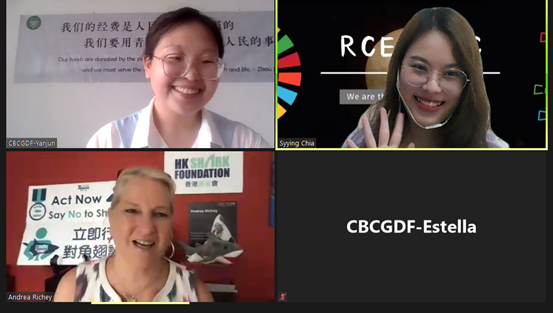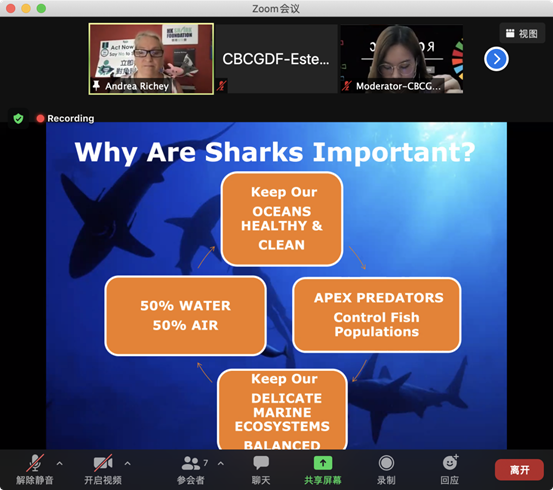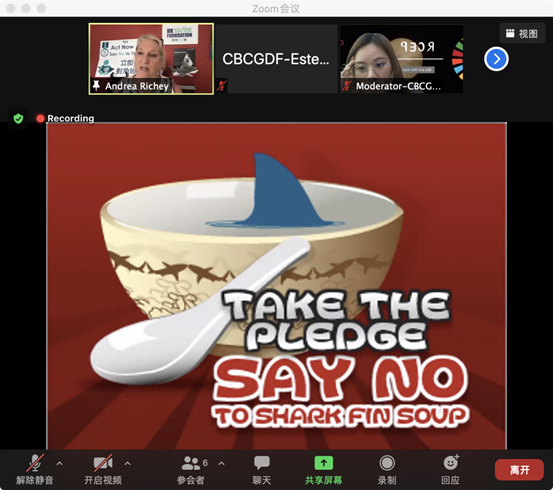From Beijing time 14:00-15:30 on July 14, 2021, the 7th RCEP 4C meeting hosted by the RCEP Working Group of the CBCGDF was successfully held online. The topic of this meeting was "Discuss Ecological Value of Sharks and Convention Measures on Shark Awareness Day".
This meeting invited Andrea Richey, the shark lady from the Hong Kong Shark Foundation, to tell her story about sharks. About 9,000 people participated in this meeting. Syying, from the RCEP working group presided over the meeting.
Playback link:
http://live.baidu.com/m/media/pclive/pchome/live.html?room_id=4596933206&source=h5pre

Source:RCEP working group
Yanjun Xu from the RCEP working group gave an opening speech for the meeting. She thanked the guests and briefly introduced the purpose of the RCEP working group: RCEP provides a good platform for non-governmental communication, cooperation and environmental protection. She then raised the topic of today's meeting: Sharks' ecological value and protection measures on Shark Day.
The number of sharks continues to decline, but sharks play an important role in the balance of the ecosystem. We should raise the public's awareness of shark protection, and thanks again for everyone's participation.

Source:RCEP working group
The Shark Lady, Andrea Richey is the Executive Director of the Hong Kong Shark Foundation. She told everyone about the current situation of sharks and protection measures. She mentioned that people kill 100 million sharks every year. Also, despite there're many kinds of sharks, only 12 of them are protected by law. The good news is that we are working hard to make more kinds of sharks protected by law.

Source:RCEP working group
【Why do we need sharks? 】
-Sharks make the ocean healthier and cleaner
-50% of the earth's water and air come from the ocean
-Sharks make the marine ecosystem more balanced
-Sharks are the top predators in the food chain, controlling fish populations.
Source:RCEP working group

Source:RCEP working group
Sharks are very gentle and generally do not attack humans. But humans are now catching a lot of sharks to get shark fins to make money. The disasters faced by sharks are global.
Shark fins have no nutritional value and taste. The taste only comes from the soup. People generally eat shark fins to show off their status. Nowadays, we have received a lot of education about protecting animals. We should no longer use eating animals to show off ourselves. Overfishing result from food is the core reason for the sharp decline in the number of sharks.
【How to protect sharks?】
In the United Kingdom, Singapore and other countries, some restaurants will use confusing dish names to induce consumers to consume sharks and eat sharks. Therefore, we should raise our awareness and be wary of unknown consumption.
Shark oil is used to make lipstick, and some shoes are made of shark skin. Therefore, when consuming goods, we must pay attention to product labels, which is a way to protect sharks.
Plastic pollution destroys the marine environment. When the plastic melts in the water, it emits many harmful chemicals, which endanger the health of marine life, such as sharks and endangers human health. We should consider banning the consumption of sharks.

Source:RCEP working group
Our changes are vital to environmental protection. "Nobody can do everything, but everyone can do one thing." "No trade, no harm" let's say no to shark fins.

Source:RCEP working group
For the second half of the conference, Ms. Shark answered questions from the audience:
i.How did you become interested in sharks?
ii.And how did you get involved with the HK Shark Foundation?
iii.What is the toughest part of raising awareness about shark protection in Hong Kong?
iv.We understand that the local community is crucial for marine protection, but what if the local culture is prone to harm the sharks(Denmark and Japan, for example), what should we do to raise local awareness against its culture?
v.From your perspective, what can young people do to help build a more sustainable world?
vi.Do you have any words for the audience?
More information and details of the 7th RCEP 4C Conference of CBCGDF will be released. Please follow CBCGDF official WeChat account and RCEP 4C official website:http://www.rcep4c.org/
Transaltor/Estella
Checked/Syying
Original Chinese article: https://mp.weixin.qq.com/s/dQEO4HsaQd_-Gp3qX3LgKw
Contribution
https://www.paypal.me/CBCGDFChina
http://www.cbcgdf.org/English/ConfirmDonaTion/0.html
